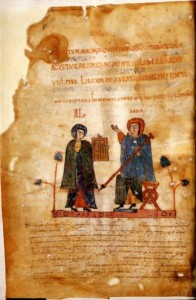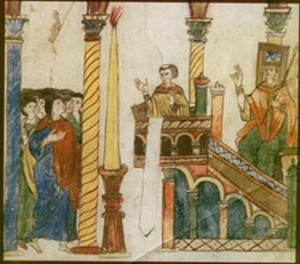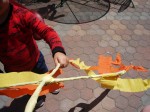Hispanic-Mozarabic Rite from Spain Celebrated
 On May 16, 2015 the Holy Sacrifice of the Mass was celebrated at St. Peter’s Basilica according to the Hispanic-Mozarabic Rite for the 4th time in history. The first time was in 1963 during the Vatican II Council. In 1992 it was celebrated by Saint John Paul II when the revised Mozarabic Missal and Lectionary were promulgated. And most recently, on December 16, 2000 the Feast of the Annunciation was commemorated according the Hispanic-Mozarabic Calendar.
On May 16, 2015 the Holy Sacrifice of the Mass was celebrated at St. Peter’s Basilica according to the Hispanic-Mozarabic Rite for the 4th time in history. The first time was in 1963 during the Vatican II Council. In 1992 it was celebrated by Saint John Paul II when the revised Mozarabic Missal and Lectionary were promulgated. And most recently, on December 16, 2000 the Feast of the Annunciation was commemorated according the Hispanic-Mozarabic Calendar.
The Hispanic-Mozarabic Rite, sometimes called either the Gothic or Visigothic Rite, is the ancient liturgy of Spain. (The term Hispanic in this case refers to its origin and reference to Spain itself.) The rite was formed and codified over the centuries by many great Saints, most notably St. Isidore (San Isidoro) of Seville and his brother and predecessor, St. Leander (San Leandro). Later, the councils and saintly bishops of Toledo took an active role in its standardization. Since the 11th century, the city of Toledo has been its primary home, with the city’s archbishop as its custodian and protector. Today Toledo’s archbishop is Braulio Rodríguez Plaza, who celebrated the venerable liturgy at St. Peter’s during a pilgrimage to the Eternal City.
The liturgy he celebrates is as ancient as the memory of Christianity in Spain. There are elements of the liturgy that remind people of the great liturgies of the East, such as the chanting of the closing words of the Holy, Holy in Greek and the standardized prayers of the faithful called The Diptych. There are elements that remind people of the Roman Rite, with its opening prayer after the Gloria and the structure of the Eucharistic Prayer. Then there are things that are familiar but seem to be out of place for a Roman Catholic, for example the Creed is prayed after the Eucharistic prayer, before the Our Father, and the “Final Blessing” is given right before Communion. People who are fond of dialogue at Mass will like that there is more interactive participation by the people. The same people might be turned off by the priest praying the Our Father for the whole assembly. But, then again, they might be excited by the fact that to each of the seven petitions of the Our Father the people sing “Amen”.
As a celebrant, I particularly like that the Mozarabic rite has ten proper (thematic) prayers for each Mass. This makes for a celebration of Mass that is unified in theme from beginning to end. In the Roman Rite we have only three proper prayers per Mass, plus a few proper Prefaces and Final Blessings. Whereas in the Roman Rite the introductions to the Our Father and the Sign of Peace are standardized and unchanging, in the Mozarabic Mass they are proper for each Mass and unique for each Sunday and thus contain the themes of the Mass.
The prayers of the Mozarabic Mass in general are longer than a Roman Rite Catholic would be used to, but they are very rich. A Roman Rite Opening Prayer (the Collect) is typically one sentence. By contrast, the Opening Prayer (Post-Gloria) in the Mozarabic Rite might be as long as a page or so. A Roman Preface is about a page while a Mozarabic Preface (Illatio) can range from a half of a page to three or four pages. Roman prayers are said to have a noble simplicity; Mozarabic prayers tend to be poetic and full of scriptural stories and teachings. Sometimes a Mozarabic prayer will even be a poem with rhyme and meter. One year I returned to Mt. Angel Seminary for a little R&R after Christmas and brought my Mozarabic Missal with me. As my old Latin teacher read through the Preface (Illatio) for Christmas he audibly gasped three or four times. As he finished, he looked up and said, “This is really beautiful Latin.” Then with a smile and love in his voice he added, “It’s about the Blessed Virgin.” I responded, “Who knows, maybe the great St. Isidore wrote that one himself.”
As the kings of northern Spain fought their way south during the Reconquista (Reconquest), they brought with them the liturgical books of the Roman Rite. When they arrived in Toledo, they found Catholics who had maintained their faith and liturgy during the 400 years of Islamic rule. While living under Islamic rule these Catholics had learned Arabic and adopted new fashions of clothing, but never lost their identity. They were dubbed, “Mixto-Arabs” or Mozarabes and the rich faith and liturgy that sustained them against persecutions and trials then, still nourishes and inspires them and many others today.
During this season of the Resurrection, let us close with the Prayer for Peace (Ad Pacem) for the Sixth Sunday of Easter from the Hispanic-Mozarabic Mass.
Conserve in your peace, Lord, those whom you redeemed with the abundant out-pouring of your blood; free from scandal those for whom you hung upon the wood. Make worthy, through works of charity, those who, being guided by your grace, you adopted as sons and daughters. So that we who celebrate the victory of your resurrection, rising at the time of the Last Judgment, will be placed crowned at your right with the sheep. R/. Amen
Grant this, Oh God, through the author of peace and love, our Lord Jesus Christ, with whom you are one lone and co-equal essence in the unity of the Holy Spirit, God, reigning for ever and ever. R/. Amen.
Image: 11th Century Mozarabic Antifonary Folio from the Cathedral of León, Spain
Public Domain
























